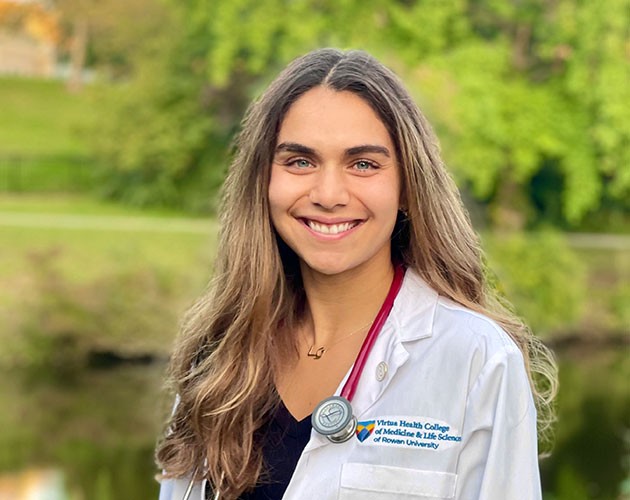Making an Impact Where It Matters

When Grecia Ortiz Flores attended UC Davis, she majored in neurobiology, physiology and behavior based on her interest in learning about the specifics of anatomy, physiology and the overall function of the human body. Complementing her studies was part-time experiences working with children as a teacher, as a student assistant for UC Davis Health and as an undergraduate student researcher intern.
As a first-generation college student, Grecia had her eyes toward applying to medical school and was in search of a flexible, supportive program. Specifically, Grecia needed guidance on navigating the medical school application process and with personal statements, as well as had a desire to become part of a community she could rely on and ask questions to. Shortly after completing her undergraduate degree, Grecia applied and was accepted into our Post-Baccalaureate Health Professions Program, in which she also gained access to advisers and mock interviews.
“I had been planning on taking the MCAT in the first three months of the pandemic but then pivoted to working and strengthening my application for medical school,” she says. “I was able to get support with MCAT studying. Having someone to ask questions to was very important for me, and being able to work concurrently—as an EMT and medical assistant—was also really important.”
Connections with our instructors and staff made her experience not only personal, but also useful and structured.
“During The Biology of Human Cancer and other courses, the instructors were very helpful in simplifying hard topics with diagrams and logical explanations,” Grecia commends. “They emphasized the relevance to health fields and were always open to rephrase and meet with you after class or in office hours to discuss any questions you may have.”
Outside of the classroom, Grecia’s work as an EMT in Contra Costa and Alameda Counties at the peak of the COVID-19 pandemic proved that a career in health care was where she was meant to be. Her dedication to the field during what she describes as a “heavy time for health care” led to an impactful leadership role as a field training officer.
“I became comfortable with patient care and encounters with other medical professionals such as physicians, nurses and other health care providers,” Grecia explains. “I learned a lot about insurance, medications, the general physical exam, et cetera. I was also able to participate in critical-care transport, work with nurses, and see and engage in medical transport with increased complexity.
“This job allowed me to gain comfort in the understanding of health systems flow, see the value of teamwork and gain confidence in my own skills. I gained empathy. Being closer to the patient side of medical care—often seeing their homes and the other facilities they come from—allowed me to have insight into the complexity of accessing that care.”
She also managed to find time to be a vaccine clinic volunteer; a telemedicine engagement liaison; and a clinical volunteer interpreting, triaging and scribing during her studies.
“All of my volunteer work was really reflective of my passion for my community and to rectify disparities within the medical field,” she tells me. “These experiences allowed me to maintain my motivation and reminded me why I was pursuing a medical career. I met really great people throughout my journey who motivated me to become a positive agent of change and work toward the improvement of the communities I came from.”
Past Experiences Shape Future Goals
Coming from a low-income, underserved community and during her various health care–related roles, Grecia witnessed and experienced firsthand the racial and social inequities in medicine. Her passion to rectify these disparities is what motivates her to pursue a career as a physician and be a positive agent of change. And something she is on track to accomplish as a student in the Program in Medical Education for the Urban Underserved (PRIME-US)!
When we previously spoke with Grecia for the Class of 2023 blog, she mentioned that in five years she would be graduating from the UCSF PRIME-US Program—a track at the UCSF School of Medicine and the UC Berkeley-UCSF Joint Medical Program for students interested in serving underserved communities—and moving forward in her health care career. In 10 years, she predicts she will have graduated from her residency and be working with minority and underserved populations.
“I am interested in dermatology and anesthesiology,” she says. “In my previous work at a free clinic, I observed the poor distribution of resources and the challenges to accessing quality care. There are huge costs associated with care that is already less accessible to underserved communities. It is even harder to access specialty care, and this often will lead to the worsening and often diagnosis at an advanced stage for a very treatable and manageable condition.”
Thinking back, Grecia says, “The Post-Baccalaureate Health Professions Program allowed me to increase my academic competitiveness; gain access to different volunteer opportunities; and receive advice on the application process, personal statements and different portions of the medical school application. I was provided a space to explore my own interests while growing academically, as well.
“The UCSF PRIME-US program will allow me to gain the skills necessary to treat the populations that I want to treat,” she relates.
“While I have not decided the level at which I want to engage in serving these populations, what I do know is that regardless of the local or global role, I want to make sure that I am making an impact and working toward making changes to improve health care disparities.”


